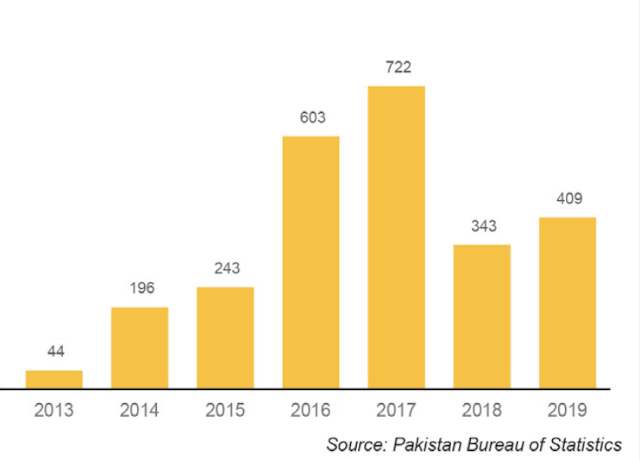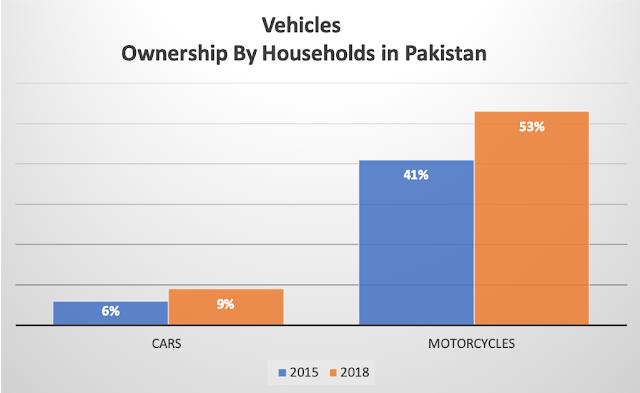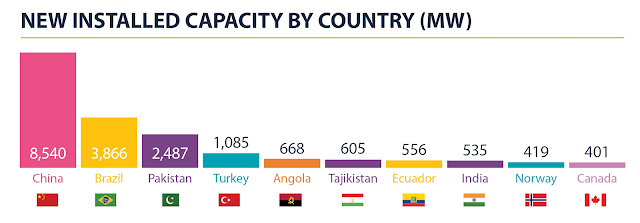PakAlumni Worldwide: The Global Social Network
The Global Social Network
Renewable Energy in Pakistan: 15.2% of Households Use Solar
Solar panel installations in Pakistani homes are rising rapidly. Pakistan PSLM/HIES 2018-19 survey results reveal that 15.2% of all households are using solar panels as a source of energy for their homes. Khyber-Pakhtunkhwa province leads the nation with 40% of all households using solar energy. Rural Pakistan is embracing solar power at a faster rate than Urban Pakistan. Adoption of solar in rural areas of KP is at 43%, Sindh 33.9%, Balochistan 20.4% and Punjab 7.9%. Rapid decline in cost of solar panels appears to be driving the adoption of solar in Pakistan's rural areas where grid power is either unavailable or unreliable. Pakistan is starting to join the clean energy revolution with increasing adoption of solar and recent announcement of National Electric Vehicle Policy. Covid19 pandemic may temporarily slow it down but the upward trend will likely continue.
Pakistan Solar Panel Imports in Millions of US Dollars. Source: FBS... |
Solar Panels in Pakistan:
Imports of solar panels have increased at 15.9% annually in US dollar terms and 22.6% in Pakistan rupee terms in the last years. Solar panel imports have jumped from just $1 million in 2004 to a peak of $772 million in the fiscal year ending June 30, 2017, then declined to $343 million in 2018 and then rose again to $409 million in 2019. Covid19 pandemic may temporarily slow it down but the upward trend will likely continue.
Households Using Solar Panels. Source: PSLM/HIES 2018-19 Via Bilal ... |
Solar panel installations in Pakistani homes are rising rapidly. Pakistan PSLM/HIES 2018-19 survey results reveal that 15.2% of all households are using solar panels as source of energy for their homes.
Government survey data shows that 20% of rural households are using solar panels, significantly ahead of just 7.7% urban households in the country. Khyber-Pakhtunkhwa province leads with 40% of households using solar energy, followed by Balochistan 25.7%, Sindh 20.5% and Punjab 6.4%.
Rural Pakistan is leading the nation into wider use of solar power. Adoption of solar in rural areas of KP is at 43%, Sindh 33.9%, Balochistan 20.4% and Punjab 7.9%. Rapid decline in cost of solar panels appears to be driving adoption of the solar energy in Pakistan's rural areas where grid power is either unavailable or unreliable.
Pakistan Electric Vehicle Policy:
Pakistan has a low level of motorization with just 9% of the households owning a car. Nearly half of all households own a motorcycle. Motorization rates in the country have tripled over the last decade and a half, resulting in nearly 40% of all emissions coming from vehicles. Concerns about climate change and environmental pollution have forced the government to to take a number of actions ranging from adoption of Euro6 emission standards for new vehicles with internal combustion engines (ICE) since 2015 and announcement of a national electric vehicle (EV) policy this year.
Private vehicle ownership in Pakistan has risen sharply over the last 4 years. More than 9% of households now own cars, up from 6% in 2015. Motorcycle ownership has jumped from 41% of households in 2015 to 53% now, according to data released by Federal Bureau of Statistics (FBS) recently. There are 32.2 million households in Pakistan, according to 2017 Census.
Pakistan's National EV Policy is a forward looking step needed to deal with climate concerns from growing transport sector emissions with rapidly rising vehicle ownership. It offers tax incentives for buyers and sellers. It also focuses on development of nationwide charging infrastructure to ease adoption of electric vehicles.
Low Carbon Energy Growth:
In recent years, Pakistan government has introduced a number of supportive policies, including feed-in tariffs and a net metering program to incentivize renewables. These have been fairly successful, and renewables capacity in the country surged substantially over 2018 when 1245 MW was added, of which 826MW was contributed by the solar sector, according to Fitch Solutions.
Pakistan’s Alternative Energy Development Board (AEDB) recently signed deals for projects that will see the country expand its wind power capacity by 560 MW. Fitch Solutions forecasts Pakistan's solar capacity to grow by an annual average of 9.4% between 2019-2028, taking total capacity over 3.8GW by the end of our forecast period.
Sindh government has recently signed a deal for 400MW solar park at Manjhand, 20MW rooftop solar systems on public sector buildings in Karachi and Hyderabad, and 200,000 solar home systems for remote areas in 10 districts of the province. The project is estimated to cost USD105million, with the World Bank funding USD100 million.
The biggest and most important source of low-carbon energy in Pakistan is its hydroelectric power plants. Pakistan ranked third in the world by adding nearly 2,500 MW of hydropower in 2018, according to Hydropower Status Report 2019. China added the most capacity with the installation of 8,540 megawatts, followed by Brazil (3,866 MW), Pakistan (2,487 MW), Turkey (1,085 MW), Angola (668 MW), Tajikistan (605 MW), Ecuador (556 MW), India (535 MW), Norway (419 MW) and Canada (401 MW).
New Installed Hydroelectric Power Capacity in 2018. Source: Hydrowo... |
Hydropower now makes up about 28% of the total installed capacity of 33,836 MW as of February, 2019. WAPDA reports contributing 25.63 billion units of hydroelectricity to the national grid during the year, “despite the fact that water flows in 2018 remained historically low.” This contribution “greatly helped the country in meeting electricity needs and lowering the electricity tariff for the consumers.”
Chinese BYD in Pakistan:
Multiple media reports suggest that China's BYD is about to enter Pakistan market following the announcement of Pakistan National EV Policy. These reports indicate that Toyota, one of the largest automakers in Pakistan, has signed a deal with BYD to manufacture electric vehicles.
Other reports indicate that Pakistan's Rahmat Group is in talks with BYD to set up an electric vehicle plant at Nooriabad in Sindh province.
Minister for Science and Technology Fawad Chaudhry has claimed that in three years Pakistan will become the first country to manufacture electric buses, which will be driven by an electric motor and obtains energy from on-board batteries.
Summary:
Pakistan is starting to join the clean energy revolution with increasing adoption of solar and recent announcement of National Electric Vehicle Policy. Solar panel installations in Pakistani homes are rising rapidly. Pakistan PSLM/HIES 2018-19 survey results reveal that 15.2% of all households are using solar panels as source of energy for their homes. The country has set targets for renewable energy growth and announced National Electric Vehicle Policy. In recent years, Pakistan government has introduced a number of supportive policies, including feed-in tariffs and a net metering program to incentivize renewables. These have been fairly successful, and renewables capacity in the country surged substantially over 2018 when 1245 MW was added, of which 826MW was contributed by the solar sector, according to Fitch Solutions. High-capacity battery pack costs have dropped nearly 40% since 2015, according to Wood Mackenzie data as reported by Wall Street Journal. Cost reductions are expected to continue to only $8 to $14 per MW-hour by 2020, or about a penny per kW-hour. While production and use of renewable energy are growing, the electric vehicles in Pakistan have yet to find traction. Hopefully, the National EV policy will encourage production and adoption of electric vehicles in the country. Covid19 pandemic may temporarily slow it down but the upward trend will likely continue.
Related Links:
Clean Energy Revolution in Pakistan
Pakistan Electric Vehicle Policy
Recurring Cycles of Drought and Floods in Pakistan
Pakistan's Response to Climate Change
Massive Oil and Gas Discovery in Pakistan: Hype vs Reality
Digital BRI: China and Pakistan Building Fiber, 5G Networks
Growing Water Scarcity in Pakistan
China-Pakistan Economic Corridor
Ownership of Appliances and Vehicles in Pakistan
-
Comment by Riaz Haq on September 27, 2024 at 9:31am
-
JCM Power wins 240 MW hybrid PV-wind project in Pakistan with $0.031/kWh bid
https://www.pv-magazine.com/2024/09/25/jcm-power-wins-240-mw-hybrid...
JCM Power has won a 240 MW hybrid wind-solar project in Pakistan with a bid of $0.031/kWh. The facility will be located in Dhabeji, near Karachi, and will supply power to local utility K-Electric.
Canada's JCM Power has said that it will build a 240 MW (AC) hybrid wind-solar project in Dhabeji, near Karachi, Pakistan.
The company secured the project through a procurement exercise held by utility K-Electric. It submitted a bid of PKR 8.9189 ($0.031)/kWh. The tender was held with the supervision of the National Electric Power Regulatory Authority (NEPRA).
JCM Power said it will partner with Pakistan-based Burj Capital and Gharo Solar Limited in the development and construction of the facility.
The project has been described as the largest renewable energy facility to be included in K-Electric's network to date. It will be linked to a 220 kV grid station operated by the private utility.
Pakistan’s cumulative installed solar capacity stood at 1.2 GW at the end of 2023, according to figures from the International Renewable Energy Agency (IRENA).
-
Comment by Riaz Haq on March 15, 2025 at 10:06am
-
Faysal Bank, Akhuwat Foundation, TCF partner for interest-free solar financing
https://www.thenews.com.pk/print/1290007-faysal-bank-akhuwat-founda...
KARACHI: Faysal Bank Limited (FBL) has strengthened its commitment to sustainability and women’s empowerment by partnering with Akhuwat Islamic Microfinance (AIM) and The Citizens Foundation (TCF), a statement said.
Under this collaboration, the bank aims to provide women with interest-free solar financing. Launched on International Women’s Day, this initiative reflects FBL’s long-term vision of creating an equitable and sustainable future while making a real impact through corporate social responsibility (CSR).
This initiative will allow educators and women across Pakistan to install solar systems with flexible repayment plans.
By promoting green energy, this initiative supports global climate goals. It helps reduce electricity costs, lowers carbon emissions, and lessens reliance on the national grid. Faysal Bank remains committed to meaningful change, ensuring financial relief and sustainability for educators—most of whom are women -- so they can continue shaping future generations.
Speaking on the occasion, President and CEO of Faysal Bank Yousaf Hussain stated: “At Faysal Bank, we believe that true progress is driven by sustainability and empowerment, leading to meaningful action. Through this initiative, we are not only promoting renewable energy but also alleviating financial burdens and fostering long-term resilience for women. In line with this year’s International Women’s Day theme, Accelerate Action, we remain steadfast in our commitment to creating a more inclusive, equitable, and sustainable future -- one where all women have the opportunity to thrive”.
Founder of Akhuwat Foundation Dr Amjad Saqib said: “Our collaboration is a step towards creating a more sustainable and equitable society. By offering interest-free solar financing, we are not only contributing to environmental conservation but also uplifting women and educators, providing them with financial independence and a cleaner, greener future. We extend our heartfelt gratitude to Faysal Bank for supporting this noble cause.”
CEO of TCF Asad Ayub shared his remarks: “This partnership brings together our shared vision of empowering women and ensuring a sustainable future for the next generation. By providing access to solar energy, we are equipping women with the tools for a brighter, self-sufficient tomorrow. We are grateful to Faysal Bank and Akhuwat Foundation for making this initiative possible.”
Comment
- ‹ Previous
- 1
- …
- 4
- 5
- 6
- Next ›
Twitter Feed
Live Traffic Feed
Sponsored Links
South Asia Investor Review
Investor Information Blog
Haq's Musings
Riaz Haq's Current Affairs Blog
Please Bookmark This Page!
Blog Posts
Pakistan to Explore Legalization of Cryptocurrency
Islamabad is establishing the Pakistan Crypto Council (PCC) to look into regulating and legalizing the use of cryptocurrencies, according to media reports. Cryptocurrency refers to digital currencies that can be used to make purchases or investments using encryption algorithms. US President Donald Trump's endorsement of cryptocurrencies and creation of a "bitcoin reserve" has boosted investors’…
ContinuePosted by Riaz Haq on March 28, 2025 at 8:30pm — 2 Comments
World Happiness Report 2025: Poor Ranking Makes Indians Very Unhappy
Pakistan has outranked India yet again on the World Happiness Index, making Indians very very unhappy. Indian media commentators' strong negative emotional reaction to their nation's poor ranking betrays how unhappy they are even as they insist they are happier than their neighbors. Coming from the privileged upper castes, these commentators call the report "…
ContinuePosted by Riaz Haq on March 22, 2025 at 10:30am — 7 Comments
© 2025 Created by Riaz Haq.
Powered by
![]()





You need to be a member of PakAlumni Worldwide: The Global Social Network to add comments!
Join PakAlumni Worldwide: The Global Social Network